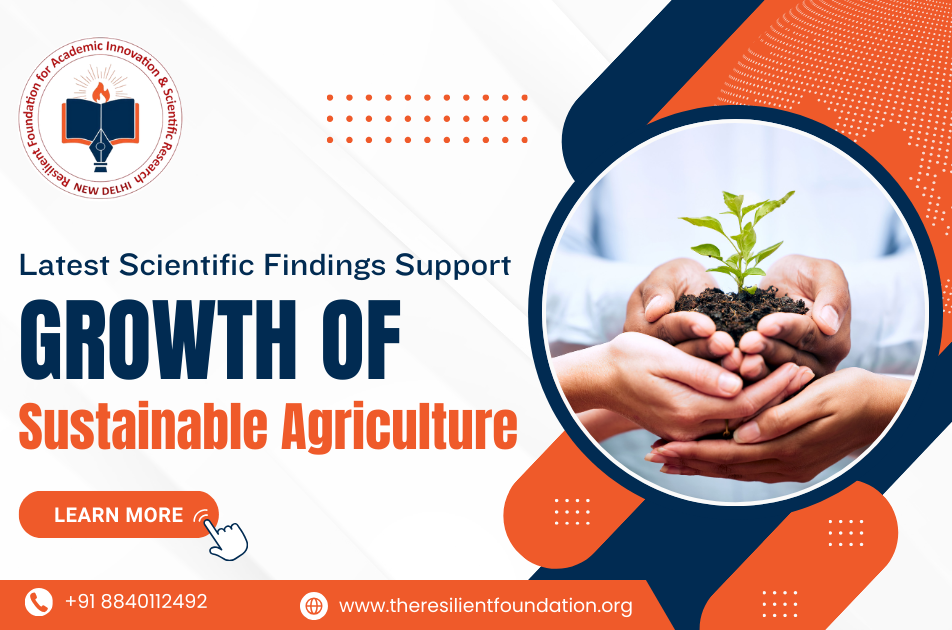Farming today is not just about growing crops. It is also about growing smartly and safely. With the help of new science and technology, sustainable agriculture is growing fast. Scientists are finding better ways to protect the soil, save water, reduce waste, and still grow more food. This helps both farmers and nature. Because of that, many people are now supporting farming ways that are good for the earth and the next generation. These new scientific ideas are making farming easier, cleaner, and more helpful for everyone.
Latest Scientific Findings Shaping Sustainable Farming
Many research teams are improving farming methods. Recent studies show smart, safe practices benefit both land and farmers. Agricultural research supports crop rotation, organic materials, and water management. New tools help farmers save time and money. These scientific findings give better ways to grow crops and protect nature. Learning these updates is major for those doing sustainable agriculture the right way.
🌾Agricultural Waste Conversion Through Bio-Engineering
Scientists are now turning waste into helpful products using innovation in agriculture. Here are some examples of how bioengineering is changing farm waste into something useful:
- Crop waste into compost: Farmers used to throw away crop leftovers. But now, machines and microbes can turn this waste into rich compost. This compost goes back into the soil and helps plants grow better.
- Making clean fuel from farm waste: Plant and crop remains can now be used to make biofuels. These fuels can be used in tractors and machines. This helps save the environment and also cuts fuel costs.
- leftovers into animal food: Some crops that cannot be sold are now turned into healthy food for animals. This helps reduce waste and also supports animal farming.
- Eco-friendly packaging: They are making biodegradable plastics from plant waste. These are better than regular plastics because they break down naturally and don’t harm the earth.
So, by using bioengineering, farmers can reduce waste and also earn more. We cover these topics in our training programs so searchers can learn how to use their farm waste smartly.
💡Advancements in Soil Microbiome Research
Soil health is very important for farming. Agricultural research shows that tiny living microbes help make the soil better and help crops grow naturally. Let’s see how science is helping through these microbes.
- Adding good microbes to the soil: Scientists have created microbial products that can be added to the soil. These help plants take in more nutrients and grow stronger.
- Fighting plant diseases: Some microbes fight off harmful pests and diseases. This means farmers can use fewer chemical sprays.
- Helping with climate change: Some soil microbes trap carbon in the ground. This helps reduce harmful gases in the air and keeps the planet cooler.
- Increase water-holding capacity: Microbes can also help the soil hold more water. This is very helpful for dry areas where water is not easily available.
Because of that, understanding soil microbes is becoming a big part of sustainable agriculture. In our online workshops, we explain these ideas using simple tools and easy steps so every farmer can use them on their farm.
🌱Climate-Resilient Crops Are Being Developed
Farming is risky due to unstable weather, but smart research and AI are helping create crops that survive tough conditions. Here are some new types of crops that are helping farmers:
- Seeds that grow with less water: Scientists have made drought-resistant seeds. These grow well even when there is very little water.
- Crops that can survive floods: Some types of rice and other grains can now survive in heavy rain and floods. This is good for areas that often face floods.
- Faster-growing crops: Some crops are now growing faster than before. This helps farmers harvest in less time, mainly when the season is short.
- Crops that resist pests naturally: With the help of AI and gene research, new seeds are being made that pests don’t like. So, farmers don’t need to spray too many chemicals.
Because of these new crop types, farming is becoming safer and more reliable. In our workshops, we teach farmers how to use these seeds and also share tips from scientists and experts.
FAQs
Q1: How does science support Sustainable Agriculture?
Science helps improve farming in many ways. It offers better seeds, smarter machines, and eco-friendly tools. With sustainable agriculture, the goal is to grow food while keeping the land, water, and air safe. Scientific ideas make this possible.
Q2: Where can farmers learn about these scientific updates?
They can join our online workshops and training programs. At Resilient Foundation, we help researchers learn about innovation in agriculture, AI in agriculture, and many other helpful topics simply and clearly.
Conclusion
Science improves farming with eco-friendly methods. New agricultural research helps grow crops sustainably, protecting nature and supporting the farmers who feed us. It’s a win for both people and the land.
At Resilient Foundation, we proudly support researchers and students by offering helpful knowledge. Our training programs and online workshops are designed to teach easy and effective ways that anyone can learn. Whether understanding soil microbes, learning how to use waste, or planting smart crops, we are here to help. Let’s all work together to build a future where farming is green, smart, and sustainable. Join hands with Resilient Foundation, because every good harvest starts with good knowledge.

